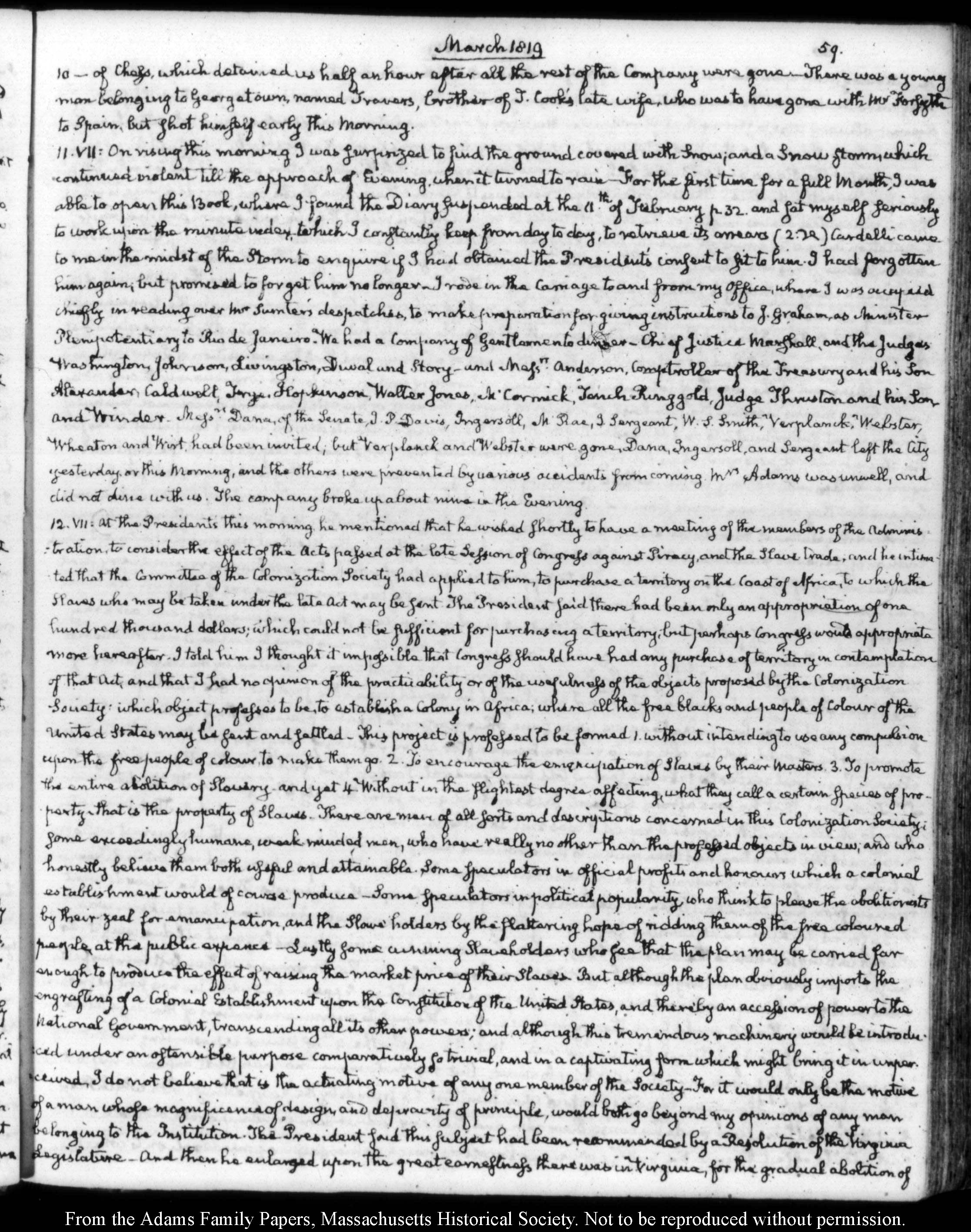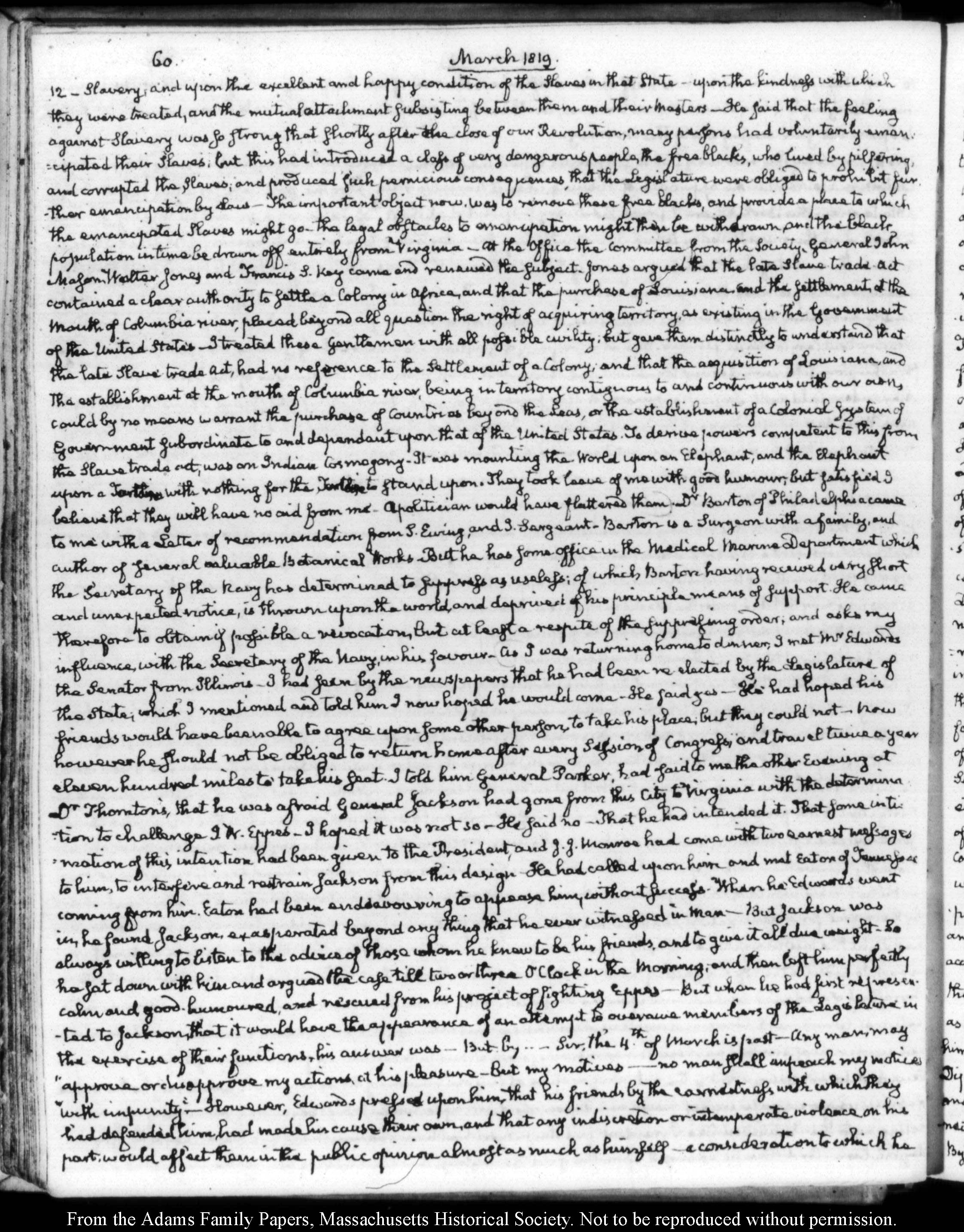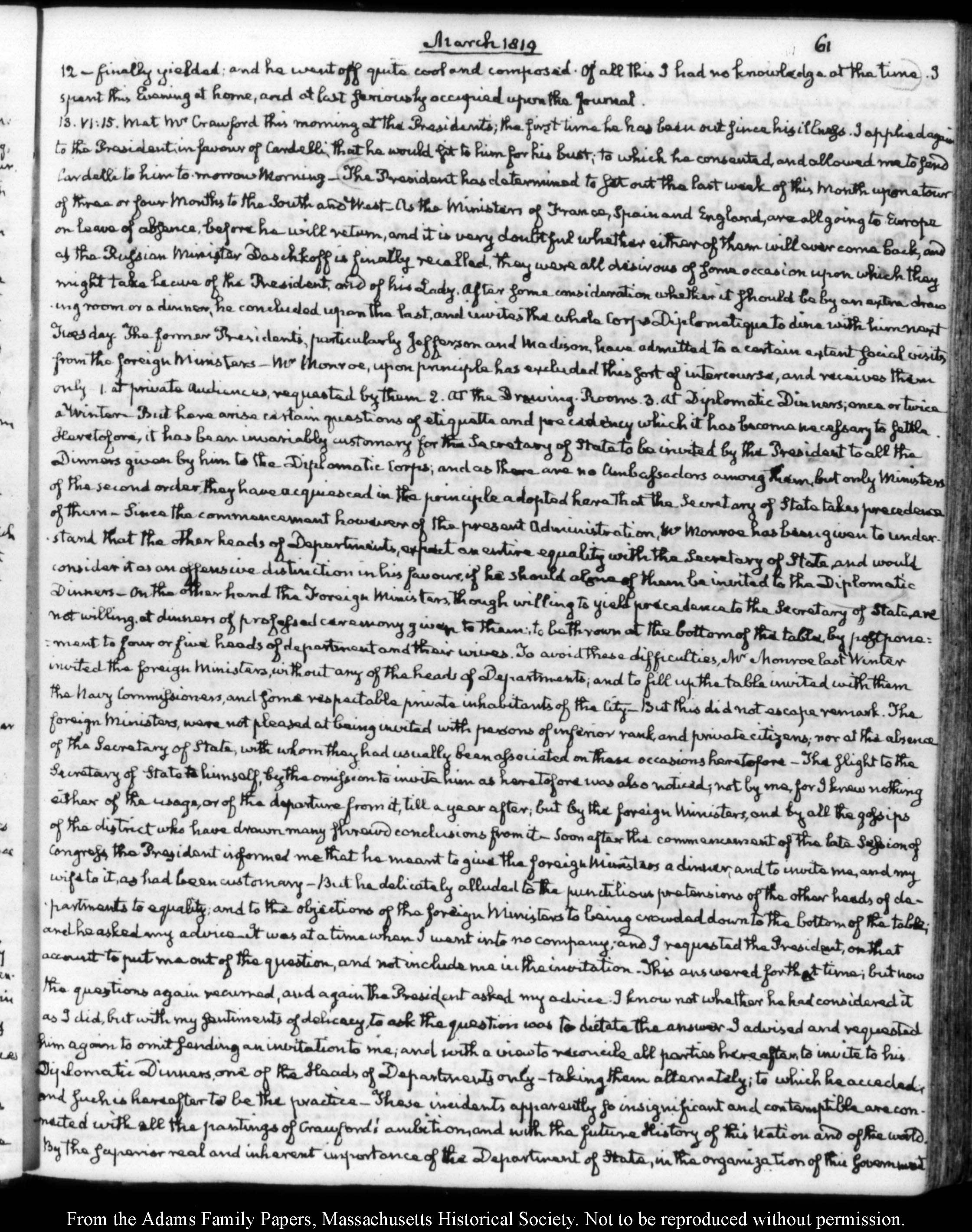59
12. VII: At the President’s this morning, he mentioned that he wished
shortly to have a meeting of the members of the Administration, to
consider the effect of the Acts passed at the late Session of Congress
against Piracy, and Slave trade; and he intimated that the Committee of
the Colonization Society had applied to him, to purchase a territory on
the Coast of Africa, to which the Slaves who may be taken under the late
Act may be sent. The President said there had been only an appropriation
of one hundred thousand dollars; which could not be sufficient for
purchasing a territory; but perhaps Congress would appropriate more
hereafter. I told him I thought it impossible that Congress should have
had any purchase of territory in contemplation of that Act, and that I
had no opinion of the practicability or of the usefulness of the objects
proposed by the Colonization Society; which object professes to be, to
establish a Colony in Africa; where all the free blacks and people of
Colour of the United States may be sent and settled— The project is
professed to be formed 1. without intending to use any compulsion upon
the free people of colour, to make them go. 2. To encourage the
emancipation of Slaves by their Masters. 3. To promote the entire
abolition of Slavery—and yet 4. Without in the slightest degree
affecting, what they call a certain species of property—that is the
property of Slaves— There are men of all sorts and descriptions
concerned in this Colonization Society; some exceedingly humane,
weak-minded men, who have really no other than the professed objects in
view; and who honestly believe them both useful and attainable. Some
speculators in official profits and honours which a colonial
establishment would of course produce— Some speculators in political
popularity, who think to please the abolitionists by their zeal for
emancipation, and the Slave holders by the flattering hope of ridding
them of the free coloured people, at the public expence— Lastly some
cunning Slaveholders who see that the plan may be carried far enough to
produce the effect of raising the market price of their Slaves— But
although the plan obviously imports the engrafting of a Colonial
Establishment upon the Constitution of the United States, and thereby an
accession of power to the National Government, transcending all its
other powers; and although this tremendous machinery would be introduced
under an ostensible purpose comparatively so trivial, and in a
captivating form which might bring it in unperceived, I do not believe
that is the actuating motive of any one member of the Society— For it
would only be the motive of a man whose magnificence of design, and
depravity of principle, would both go beyond my opinions of any man
belonging to the Institution. The President said this subject had been
recommended by a Resolution of the Virginia Legislature. And then he
enlarged upon the great earnestness there was in Virginia, for the
gradual abolition of 60Slavery, and upon the
excellent and happy condition of the Slaves in that State—upon the
kindness with which they were treated, and the mutual attachment
subsisting between them and their Masters— He said that the feeling
against Slavery was so strong that shortly after the close of our
Revolution, many persons had voluntarily emancipated their Slaves; but
this had introduced a class of very dangerous people, the free blacks,
who lived by pilfering, and corrupted the Slaves; and produced such
pernicious consequences, that the Legislature were obliged to prohibit
further emancipation by Law— The important object now, was to remove
these free blacks, and provide a place to which the emancipated Slaves
might go—the legal obstacles to emancipation might then be withdrawn,
and the black population in time be drawn off entirely from Virginia— At
the Office the Committee from the Society, General John Mason, Walter
Jones and Francis S.
Key came and renewed the subject— Jones argued that the
late Slave trade Act contained a clear authority to settle a Colony in
Africa, and that the purchase of Louisiana, and the settlement, at the
Mouth of Columbia river, placed beyond all question the right of
acquiring territory, as existing in the Government of the United States—
I treated these Gentlemen with all possible civility; but gave them
distinctly to understand that the late Slave trade Act, had no reference
to the Settlement of a Colony; and that the acquisition of Louisiana,
and the establishment at the mouth of Columbia river, being in territory
contiguous to and continuous with our own, could by no means warrant the
purchase of Countries beyond the Seas, or the establishment of a
Colonial System of Government subordinate to and dependant upon that of
the United States. To derive powers competent to this from the Slave
trade act, was an Indian Cosmogony— It was mounting the World upon an
Elephant, and the Elephant upon a Tortoise with nothing for the Tortoise
to stand upon. They took leave of me with good humour; but satisfied I
believe that they will have no aid from me— A politician would have
flattered them. Dr Barton of Philadelphia came to me with a
Letter of recommendation from S.
Ewing, and J.
Sergeant— Barton is a Surgeon with a family, and author of
several valuable Botanical Works— But he has some office in the Medical
Marine Department which the Secretary of
the Navy has determined to suppress as useless; of which
Barton having received very short an unexpected notice, is thrown upon
the world, and deprived of his principle means of support. He came
therefore to obtain if possible a revocation, but at least a respite of
the suppressing order; and asks my influence, with the Secretary of the
Navy, in his favour— As I was returning home to dinner, I met Mr
Edwards the Senator from Illinois— I had seen by the
newspapers that he had been re-elected by the Legislature of the State;
which I mentioned and told him I now hoped he would come— He said yes—
He had hoped his friends would have been able to agree upon some other
person, to take his place; but they could not— Now however he should not
be obliged to return home after every Session of Congress, and travel
twice a year eleven hundred miles to take his seat. I told him General Parker, had said to me the
other Evening at Dr Thornton’s, that he was afraid General Jackson had gone from this
City to Virginia with the determination to challenge J. W. Eppes— I hoped it was not so— He
said no— That he had intended it. That some intimation of this intention
had been given to the President, and J. J.
Monroe had come with two earnest messages to him, to
interfere and restrain Jackson from this design— He had called upon him
and met Eaton of Tennessee coming
from him. Eaton had been endeavouring to appease him, without success.
When he Edwards went in he found Jackson, exasperated beyond any thing
that he ever witnessed in Man— But Jackson was always willing to listen
to the advice of those whom he knew to be his friends, and to give it
all due weight— So he sat down with him and argued the case till two or
three O’Clock in the Morning; and then left him perfectly calm and
good-humoured, and rescued from his project of fighting Eppes— But when
he had first represented to Jackson, that it would have the appearance
of an attempt to overawe members of the Legislature in the exercise of
their functions, his answer was— But, by ——— Sir, the 4th. of March is past— Any man, may “approve
or disapprove my actions, at his pleasure—but my motives—no man shall
impeach my motives with impunity”— However, Edwards pressed upon him,
that his friends by the earnestness with which they had defended him,
had made his cause their own, and that any indiscretion or intemperate
violence on his part, would affect them in the public opinion almost as
much as himself—a consideration to which he 61finally yielded; and he went off quite cool and composed. Of all this
I had no knowledge at the time. I spent this Evening at home, and at
last seriously occupied upon the Journal.



